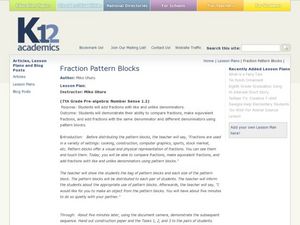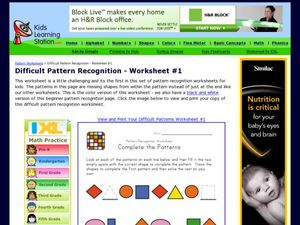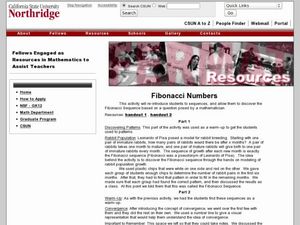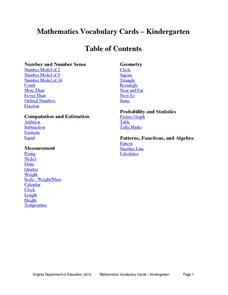Curated OER
Math and Music: Fibonacci Sequence
Students investigate the mathematical patterns of the Fibonacci Sequence. They determine how math is connected to music, specifically looking at music the uses the pattern sequence found in the Fibonacci Sequence.
Curated OER
Ranchers and Patterns
Fifth graders engage in problem solving. In this patterns instructional activity, 5th graders are presented with a problem regarding ranching that they solve as a class. Students watch a video about how patterns are used in the real...
Curated OER
Fraction Pattern Blocks
Seventh graders practice using pattern blocks. In this pre-algebra lesson, 7th graders complete tasks that require them to compare fractions, make fractions equivalent, and add fractions.
Curated OER
Pattern Recognition Worksheet: Complete the Patterns
In this patterns worksheet, students look at 4 rows of shape patterns and fill in the 2 empty spots in each row with the correct shape to complete each pattern. A good visual learning worksheet for young students.
Curated OER
Fibonacci Patterns
Learners solve problems using the Fibonacci Patterns. In this geometry lesson, students trackthe growing rate of a rabbit population. They collect the data and graph their results. They make predictions based on their results.
Virginia Department of Education
Mathematics Vocabulary Cards - Grade 2
Augment your math curriculum with posters detailing several concepts important to second grade math. Each poster features one math term from geometry, measurement, probability and statistics, computation and estimation, numbers and...
Santa Barbara City College
How to Make a Multiplication Table
Teach children how to make a multiplication table, and they'll be multiplying for life. Following this series of steps, young mathematicians learn to use patterns and the relationships between numbers to create their very own...
Curated OER
Sequence of Numbers
Reinforcing the math terms, "before," "between," and "after," is the focus of this math PowerPoint. Young mathematicians must fill in the missing number in a sequence of numbers shown on each slide. This presentation should provide...
Concord Consortium
Bricks for Books
Maximize a profit with an understanding of geometric dimension. A real-world task challenges learners to design a pattern using three different brick shapes. The bricks are dedicated with a different donation for each shape, so part of...
Virginia Department of Education
Mathematics Vocabulary Cards - Kindergarten
Enhance your math lesson with a series of pictures that illustrate different math concepts. The vocabulary includes a variety of ideas and pictures including fractions, ordinal numbers, picture graphs, and number lines.
Illustrative Mathematics
Kitchen Floor Tiles
An interesting way to look at the kitchen floor is to count the number of tiles in the border. Fred starts with four white floor tiles and writes an expression for the number of tiles needed for the colored border. Algebra learners are...
Scholastic
Adding and Subtracting Ten
Developing fluency with basic addition and subtraction is fundamental to the success of all young mathematicians. This four-day lesson series begins with learners using ten-frames and hundreds charts to recognize patterns when adding and...
Illustrative Mathematics
Growing Bean Plants (Grade 2)
After planting a bean seed in a jar, young scientists observe the growth patterns over several days. As the bean becomes a sprout, and the sprout becomes a plant, partners measure and plot the data. They notice patterns, practice...
EngageNY
The Power of Algebra—Finding Primes
Banks are responsible for keeping our financial information safe. Mathematics is what allows them to do just that! Pupils learn the math behind the cryptography that banks rely on. Using polynomial identities, learners reproduce the...
Curated OER
Missing Numbers to Twenty
Which number is missing? Beginning counters examine twenty-six number sequences, one for each letter of the alphabet. Each sequence has four numbers, ranging from one to 20. There is one number missing from the sequence, and learners...
EngageNY
Advanced Factoring Strategies for Quadratic Expressions (part 1)
Factoring doesn't have to be intimidating. Build on prior knowledge of multiplying binomials and factoring simple trinomials to teach advanced factoring of quadratic expressions with a activity that uses various methods of exploring the...
Illustrative Mathematics
Multiples of Nine
Which numbers are multiples of 9? Task class members to find the first ten multiples of 9 in a straightforward assessment learning exercise.
West Contra Costa Unified School District
Writing Exponential Functions Based on Data
Give your class a concrete example of exponential growth and decay using this hands-on activity. These Algebra II lessons allow for the exploration of exponential growth and decay models, as well as the discovery of the patterns of each....
CK-12 Foundation
Sum and Difference of Cubes: Stacking Blocks
Investigate polynomial factoring patterns by finding a connection to volume. As learners build a three-dimensional solid from smaller solids, they convert the visual model to a mathematical expression. Their models represent the sum of...
Concord Consortium
Functions by the Slice
Piece by piece ... dismantling a function can highlight interesting patterns. The task asks learners to slice functions in sections with the same vertical change. They then recreate the graph with these slices positioned horizontally....
Math Mammoth
Grade 1 Worktext
Use graphing, counting, and number lines to help first graders learn about addition and subtraction. An array of worksheets and activities are an excellent resource for your math lesson, whether you are focusing on counting skills or...
CK-12 Foundation
Recursive Formulas: Fibonacci Sequence
Explore the building blocks of the Fibonacci Sequence. Given the lengths of sides of squares, pupils deduce the pattern to determine the lengths of two more squares. Learners continue to work with recursive formulas to generate numerical...
Mathematics Vision Project
Module 4: Linear and Exponential Functions
Sequences and series are traditionally thought of as topics for the pre-calculus or calculus class, when learners are figuring out how to develop limits. But this unit uses patterns and slopes of linear functions in unique ways to bring...
CK-12 Foundation
Function Rules for Input-Output Tables: Function Machine 2
Model function operations using a function machine. An interactive lesson has learners determine the patterns of a double function machine. They use the patterns to write functions and make connections between the inputs and outputs.
Other popular searches
- Growing Patterns in Math
- Number Patterns in Math
- Geometric Patterns in Math
- Pasta Patterns in Math
- Increasing Patterns in Math
- Patterns in Math Quiz
- Repeating Patterns in Math
- Color Patterns in Math
- Identifying Patterns in Math
- Nature's Patterns in Math

























